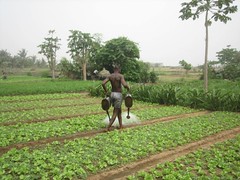Somewhat different view from the optimistic goals of the Gate's foundation agricultural strategy in Africa. Although The Nation recognizes there is validity on some of Gates' objectives, they criticized the overall approach, in particular the entrenchment of corporate seed makers as an essential component for the so-called 'African green revolution.' According to the Nation, Gates, "actively promotes an agenda that supports some of the most powerful corporations on earth."
In my view, that statement ignores the fact that the foundation, as any other grant-maker, makes its funds available through a competitive bidding process, transparent and open to all sorts of organizations such as NGO's and university. Just take a quick look to the grants given so far and you'll recognized organization doing excellent work such as WFP, IFPRI, CMMYT, Heifer, Cornell University, GTZ, etc.
One of Gates' recent grantees is CIAT (Centro International de Agricultura Tropical). I had the fortune to visit CIAT earlier this year on my trip to Colombia. Set in the fertile soils of Valle del Cauca, and surrounded by endless hectares of sugar cane, CIAT has produced a massive record of research on neglected crops, hilly agriculture, participatory approaches etc.
Unfortunately, the current staff is only one quarter of what it used to be in their heydays. Walking through their facilities -a university like setting- you could see the financial struggles they are going through: high pastures as funding for overhead is almost non existing and abandon building and research sites. Budget cuts and lack of donor interest in agricultural research, extension, and education, have curtail the availability of CIAT and other CGIAG research center to maintain the level of work they had in the 70s and 80.
We should loudly applaud the recent boost Gates is given to CIAT and other research efforts. Instead of critizining their effort, we Nation should participate on a constructive dialoge on the most effective mechanismins to lift African farmers out of poverty.

